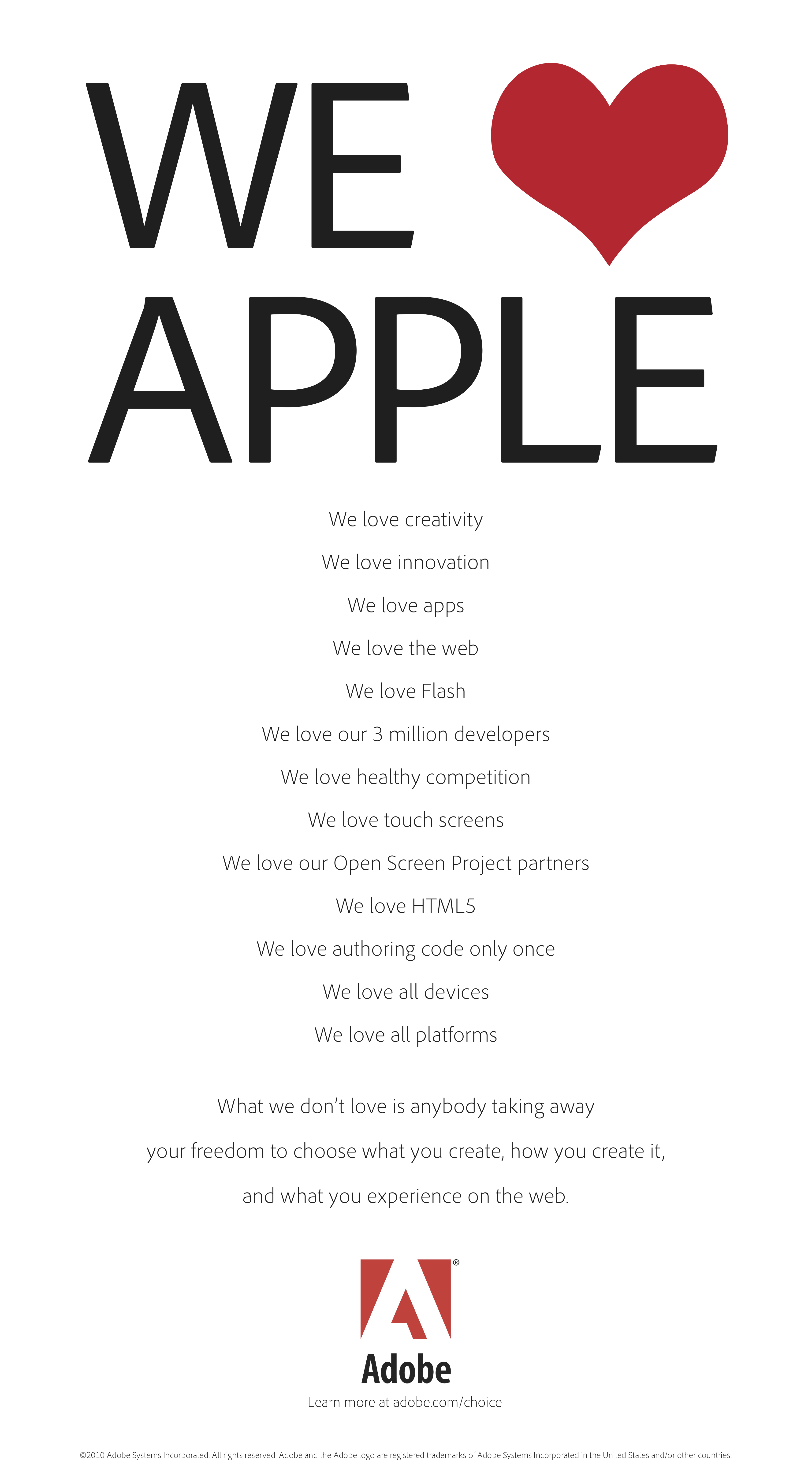
A Slight Confrontation
Adobe saw the future was heading towards a device diverse internet. People would be connecting to the internet in a variety of ways, and the internet should work no matter how it was being viewed. While the company was willing to head towards the future, not everyone was betting on Adobe. InApple released their new smartphone, the iPhone, without the ability to use Flash.
In April 2010, Apple justified their decisions publically in Steve Job's Thoughts on Flash. In this letter, Jobs asserts that:
[at Apple,] we strongly believe that all standards pertaining to the web should be open. Rather than use Flash, Apple has adopted HTML5, CSS and JavaScript - all open standards. Apple's mobile devices all ship with high performance, low power implementations of these open standards. HTML5, the new web standard that has been adopted by Apple, Google and many others, lets web developers create advanced graphics, typography, animations and transitions without relying on third party browser plug-ins (like Flash).... [Furthermore,] most Flash websites will need to be rewritten to support touch-based devices. If developers need to rewrite their Flash websites, why not use modern technologies like HTML5, CSS and JavaScript? (Jobs)
Adobe responded with a public ad campaign claiming Apple was limiting the choices of customers. The co-founders of Adobe also wrote a response to Steve Jobs titled 'Our Thoughts on Open Markets.' In it, they focus on claims that certain publisher or types of content should never be blocked.
We believe that consumers should be able to freely access their favorite content and applications, regardless of what computer they have, what browser they like, or what device suits their needs. No company -- no matter how big or how creative -- should dictate what you can create, how you create it, or what you can experience on the web. ("Our Thoughts on Open Markets.")
Why not use Modern Technologies?
Jobs undaunted outlook for new web technologies has a well-founded root. Why use a third party plug-in when code built into the browser will work? However, Jobs was a few years ahead of his time.
Technological change does not follow a linear path (Haas 221). While Jobs was right that HTML5 was the way of the future, many companies had not yet adopted to these new practices in 2010, and HTML5 was not available to all users. Flash was still fulfilling needs for these companies and users as HTML5 technology was further developed. As of July 2010,
HTML5 and CSS3 aren't yet finalized, some browsers--such as the current versions of Chrome and Safari--have already implemented certain draft features. And with these browsers you can see sites that have started using HTML5 and CSS3, such as CNN.com, NYTimes.com, Vimeo, and YouTube (in beta)--all employ the new [HTML5] video player, for example. Internet Explorer 8 has very Limited HTML5 support; however, IE 9 will support H.264 video, embedded audio (no plug-in required), scalable vector graphics, and CSS3. HTML5 remains in 'working draft' stage; it will still be a while before the spec is final. (Mulroy)
Flash originally was the lightweight, interactive, cross-browser compatible tool the internet needed. That need was now disappearing. Over the course of the next five years, functionality only available in Flash would be slowly replaced by HTML5. Flash would still fill the needs for legacy websites and online games, but would become less necessary for everyday web surfing.
It was clear the web was changing. Adobe had attempted to make Flash more usable for the internet, while ignoring that the internet was getting more usable without Flash.
